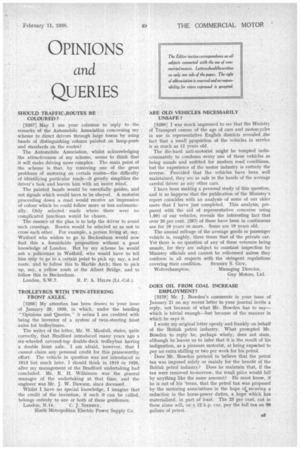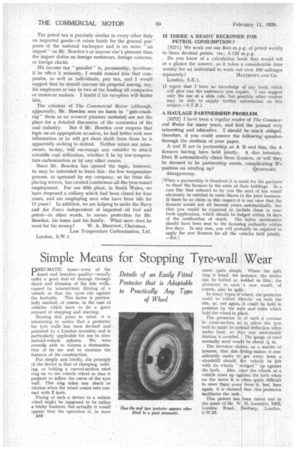OPINIONS and
Page 115

Page 116

If you've noticed an error in this article please click here to report it so we can fix it.
QUERIES
SHOULD TRAFFIC %ROUTES BE
COLOURED?
[5267] May I use your columns to reply to the remarks of the Automobile Association concerning my scheme to direct drivers through large towns by using bands of distinguishing 'colours painted on lamp-posts and standards on the routes?
The Automobile Association, whilst acknowledging the attractiveness of my scheme, seems to think that it will make driving more complex. The main point of the scheme is that, by removing one of the great problems of motoring on certain routes—the difficulty of identifying particular roads—it greatly simplifies the driver's task and leaves him with an 'easier mind.
The painted bands would be essentially guides, and not signals which would have to be obeyed. A motorist proceeding down a road would receive an impression of colour which he could follow more or less automatically. Only selected roads where there were no complicated junctions would be chosen.
The essence of the plan is to help the driver to avoid such crossings. Routes would be selected so as not to cross each other. For example, a person living at, say, Watford who wishes to go to Beckenham would now find this a formidable proposition without a good knowledge of London. But by my scheme he would ask a policeman in Watford, who would have to tell him only to go to a certain point to pick up, say, a red route, and to follow this to Marble Arch; then to pick up, say, a yellow route at the Albert Bridge, and to follow this to Beckenham.
London, S.W.7. R. P. A. HELPS (Lt.-Col.).
TROLLEYBUS WITH TWIN-STEERING FRONT AXLES".
[5268] My attention has been drawn to your issue of January 28, 1938, in which, under the heading "Opinions and Queries," it seems I am credited with being the inventor of a system' of twin-steering front axles for trolleybuses.
The writer of the letter, Mr. W. Manfull, states, quite correctly, that Bradford introduced many years ago a six-wheeled covered-top double-deck trolleybus having a double front axle. I am afraid, however, that I cannot claim any personal credit for this praiseworthy effort. The vehicle in question was not introduced in 1913 but much later, I should think in 1919 Or 1920, after my management of the Bradford undertaking had concluded. Mr. R. H. Wilkinson was the general manager of the undertaking at that time, and the engineer was Mr. J. W. Dawson, since deceased.
Whilst I have no special knowledge, I imagine that the credit of the invention, if such it can be called, belongs entirely to one or both of these gentlemen.
London, N.14. C. J. SPERREY,
North Metropolitan Electric Power Supply Co. ARE OLD VEHICLES NECESSARILY UNSAFE?
[5269] I was much impressed to see that the Ministry of Transport census of the age of cars and motorcycles in use in representative English districts revealed the fact that a small proportion of the vehicles in service is as much as 12 years old.
The die-hard anti-motorist might be tempted indiscriminately to condemn every one of these vehicles as being unsafe and unfitted for modern road conditions, but the experience of the motor industry is entirely the reverse. Provided that the vehicles have been well maintained, they are as safe in the hands of the average careful driver as any other cars.
I have been making a personal study of this question, and it so happens that the publication of the Ministry's report coincides with an analysis of some of our older users that I have just completed. This analysis, prepared with the aid of representative concerns using 1,091 of our vehicles, reveals the interesting fact that over 26 per cent. (287) of these have been in continuous use for 10 years or more. Some are 19 years old.
The annual mileage of the average goods or passenger vehicle is, roughly, three times that of the private car. Yet there is no question of any of these veterans being unsafe, for they are subject to constant inspection by Ministry officials and cannot be relicensed unless, they conform in all respects with the stringent regulations
covering their condition. SYDNEY S. GUY,
Wolverhampton. Managing Director, Guy Motors, Ltd.
DOES OIL FROM COAL INCREASE EMPLOYMENT?
[5270] Mr. J. Bowden's comments in your issue of January 21 on my recent letter to your journal invite a reply, not because of what Mr. Bowden has to say— which is trivial enough—but because of the manner in which he says it.
I wrote my original letter openly and frankly on behalf of the British petrol industry. What prompted Mr. Bowden to reply he, perhaps wisely, does not state, although he leaves us to infer that it is the result of his indignation, as a pleasure motorist, at being expected to pay an extra shilling or two per week for his petrol.
Does Mr. Bowden pretend to believe that the petrol tax was imposed solely or mainly for the benefit of the British petrol industry? Does he maintain that, if the tax were removed to-morrow, the retail price would fall by anything like the same amount? He must know, if he is out of his 'teens, that the petrol tax was proposed by the motoring associations in the hope of securing a reduction in the horse-power duties, a hope which has materialized, in part at" least. The 25 per cent. cut in these alone will, on a 12 h.p. car, pay the full tax on 90 gallons of petrol. The petrol tax is precisely similar to every other duty on imported goods—it raises furids for the general purposes of the national exchequer and is no more "an impost" on Mr. Bowden's or anyone else's pleasure than the import duties on foreign motorcars, foreign cameras, or foreign clocks.
His income tax " parallel" is, presumably, facetious; if he offers it seriously, I would remind him that companies, as well as individuals, pay tax, and I would suggest that he should canvass his proposal among, say, his employers or one or two of the leading oil companies or motorcar makers. I doubt if his reception will flatter him.
The columns of The Commercial Motor (although, aiiparently, Mr. Bowden sees no harm in " gate-crashing " them as an avowed pleasure motorist) are not the place for a detailed discussion of the economics of the coal industry. But if Mr. Bowden ever reopens that topic on an appropriate occasion, he had better seek new information or he will get short shrift from those he is apparently seeking to defend. Neither miner nor mineowner, to-day, will encourage any outsider to attack scientific coal utilization, whether it be by low-temperature carbonization or by any other means.
Since Mr. Bowden has opened the topic, however, he may be interested to learn this: the low temperature process, as operated by my company, so far from displacing miners, has created continuous all-the-year-round employment. For our fifth plant, in South Wales, we have reopened a colliery which had been closed for four years, and are employing men who have been idle for 17 years ! In addition, we are helping to make the Navy and Air Force independent of imported oil fuel and petrol—in other words, to ensure protection for Mr. Bowden, his home and his family. What more does he
want for his money? W. A. BRISTOW, Chairman, Low Temperature Carbonisation, Ltd. London, S.W.1. IS THERE A READY RECKONER FOR PETROL CONSUMPTION?
[5271] We work out our fleet m.p.g. of petrol weekly to three decimal points, viz., 5.123 m.p.g. .
Do you know of a calculation book that would tell at a glance the answer, as it takes a considerable time weekly for an individual to work out over 100 mileages separately? MATTHEWS AND CO. London, S.E.1.
regret that I have no knowledge of any book which will give you the assistance you require. I can suggest only the use of a slide rule, but possibly other readers may be able to supply further information on this subject .—S T R.
A HAULAGE PARTNERSHIP PROBLEM.
[5272] I have been a regular reader of The Commercial Motor for many years, and find the journal very interesting and educative. I should be much obliged, therefore, if you could answer the following question through the medium of your paper.
A and B are in partnership as A B and Son, the A licences having been held jointly. A dies intestate_ Does B automatically claim these licences, or will they be deemed to be partnership assets, complicating B's position on winding up? QUANDARY. Abergavermy.
[When a partnership is dissolved it is usual for the partners to share the licences in the ratio of their holdings. In a case like that referred to by you the next of kin would obviously be entitled to some shares in the joint business. If there be no claim in this respect it is our view that the licences would not all become yours automatically, but that you would be expected to include them in your fresh application, which should be lodged within 1'4 days of the notification of death. The latter notification should have been sent to the licensing authority within five days. In any case, you will probably be required to apply for new licences for all the vehicles held jointly. —Er.]




























































































































































